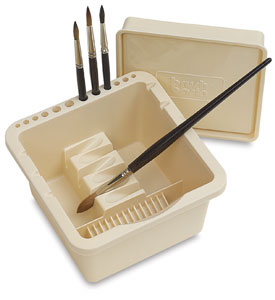How long before rinsing acrylic paint off your brush?
Reader question
Thanks Thaneeya for your help! Yours is the first website I've found that is so tremendously helpful to artists! You go out of your way to help people!
My question is about brushes and acrylic paints. While painting, just how often do I rinse my brushes as I'm painting? (The other general 'washing' is done at the sink at the end of my painting session for the day when I use soap and water).
Back to my question: just how often should I 'rinse' the brush while painting? I read someplace that 1/2 hour is the max for painting with acrylics using a brush, whether it be sable, bristle or synthetic. While 1/2 hour seems a bit long for acrylic paints to remain on a brush, I tend to rinse my brushes too often, I think. Maybe every 2 minutes or so I rinse. But then I 'lose' the texture of my brush which becomes soggy and takes a long time to dry out (even if I use a clean dry cotton rag to speed the process). So painting with that damp brush will not produce the effect that I'm after. I've got quite a few brushes, however I stick with a few of them for acrylic paints because I like their performance while painting in acrylics. One of my favorite brushes for painting in acrylics is the 'Raphael Brosse 3572 hog's bristle.' These brushes are not cheap, as you know! Hence, my fear of ruining them permanently by leaving acrylic paints on too long.
I rinse as often as I could because I'm afraid of ruining my brushes with the acrylic paints. However, is this overkill? Can I go a bit longer before rinsing my brush? Is 1/2 hour reasonable, or is that too long?
Mind you, as I'm painting, the brush stays moist with acrylic paint, it never gets a chance to dry out because I'm constantly dipping it into paint.
I keep 3 jars of clean water on my desk and use those to maintain clean brushes during acrylic painting.
Response
Thanks for your compliments about this site - I appreciate it! I'm glad my information is helpful to you.
From what you've written, it sounds like you have a really healthy brush-rinsing procedure in place. The most important thing is to make sure that the acrylics don't dry out on the brush, and it seems as if you take great care not to let that happen.
I don't know for sure if it is possible to rinse (or wash) your brushes too regularly, especially if they are being rinsed in water (and not mineral spirits, for example) and as long as they are being rinsed by swirling them gently in your water jar (rather than vigorously banging the brush against the side of your water jar to knock off paint or holding the brush under a torrent of water in the sink, for example). My educated guess is that the frequency with which you are rinsing them is fine. That said, over time if you notice the brushes are starting to wear out more quickly than you expected, perhaps you could take your frequency of rinsing into consideration.
I rinse my brushes very frequently (much sooner than every 30 minutes), especially when changing colors. Sometimes this involves just swirling the brush a few times in water then squeezing out the excess water on a paper towel, and other times this involves going to the sink and placing the paintbrush under a small but steady stream of water and squeezing out the paint from the bristles until the water runs clear into the bowl or bucket*. It all depends how much paint there is on the brush or what color I plan to use next.
Eco-friendly tip
Rinsing acrylic paint from a paintbrush into a bowl or bucket is a more environmentally-friendly method of cleaning brushes than rinsing the acrylic paint down the drain. The Golden website has great info about eco-friendly waste disposal and a DIY procedure for removing acrylic solids from your rinse water.
Some people suggest, instead of rinsing, to place the paintbrushes in a cup of clean water to prevent the paint from drying to the brush. However, I'd advise against this because if the brush is placed bristles-down in a cup of water, the bristles are in danger of getting bent and frayed. For me it's not worth the risk, because I (like most artists) prefer my brushes to retain their shape for as long as possible.
Another tip when you are painting is to make sure paint doesn't get near the ferrule (the metal band that connects the bristles with the handle), as this can cause the bristles to get frayed to the point where they can't regain their original shape.
I've provided links below to some recommended products. If you make a purchase, I get a small commission (at no extra cost to you) that helps support this site.
To help with this, you can look into getting an inexpensive Brush Tub/Washer, such as the MyLifeUNIT Paint Brush Cleaner & Holder or the Richeson Plastic Brush Bin. These products, and others like them, feature reservoirs for cleaning, holes for storing brushes upright, ridges to aid in cleaning, and structures that allow you to soak brushes in water without damaging their shape.
The more you paint, the more you will intuitively know when to rinse your brushes to keep them healthy and happy. Just keep a close eye on them so that you can spot any signs of damage early on. In general, it sounds like you are taking very good care of your brushes, so I don't think you need to change anything!
Hope that helps & Happy Painting!










